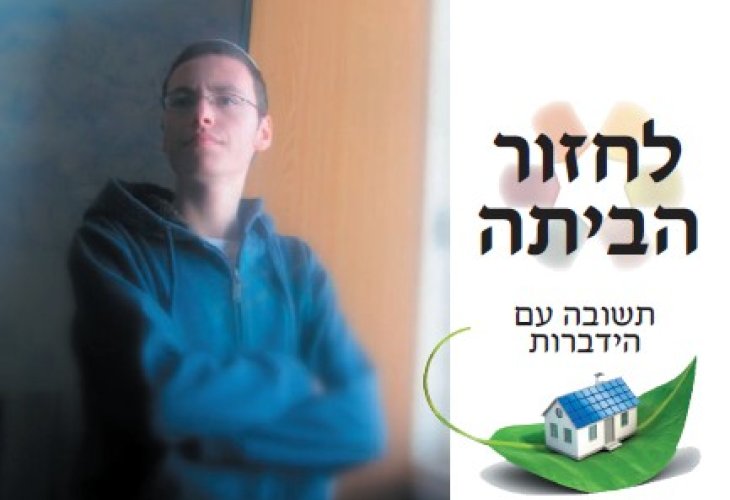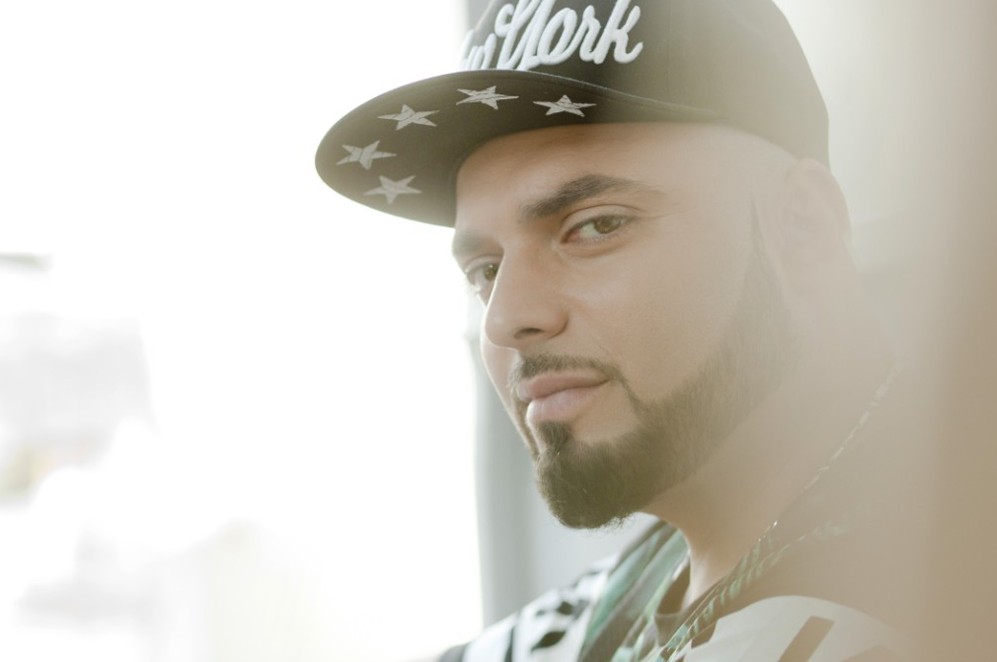Subliminal in a Special Interview: "Shabbat is My Oxygen; Spiritual Growth? I Believe and Hope It Happens"
In a personal interview with the Hidabrut website, Kobi Shimoni talks about his deep connection to Judaism, the destructive method of tying us to screens, and why he feels connected to Moses.
 Subliminal (Photo: PR)
Subliminal (Photo: PR)The current world of media, as anyone familiar with the field knows, is faster and more superficial than ever. Once it was said that the best thing you could do with yesterday's newspaper was to wrap fish, and today, the morning news edition is considered prehistoric by the evening. There are several reasons for this, primarily the internet beast seeking to devour everything with its swiftness. But let's set these reasons aside for now.
An outcome of the speed and relative shallowness of today's media is the many interviews conducted over the phone at best and via email at worst. Unfortunately, face-to-face interviews are becoming increasingly rare. However, when the opportunity arose to interview Kobi Shimoni, better known as Subliminal, one of Israel's most successful singers and connected to the tradition of Israel from a very young age, striving to get closer to Torah of Israel - even today, I requested to meet him face to face. My feeling was that as you get closer, the outer layers come off, revealing his deeper and more beautiful layers. I was happy to discover that my hope was not in vain.
"Judaism is one of my most basic elements," Shimoni says at the beginning of our conversation. "People ask me if I've strengthened in faith, and I don't understand what they're talking about. I'm already strong. I'm a completely proud traditional Jew. Within all this, there's also the Mizrahi element. Not from an ethnic place, but from a place that defines my culture, which characterizes the music I come from. We are originally Persian Mashadis. Mashadis are a very devout community whose people lived as Marranos in Iran. Inside their homes, they lived fully as mitzvah-observant Jews, but they 'played Muslim' externally."
"This is a large group of people, and we're all, essentially, one family. The Mashadis are spread all over the world. In India, Italy, the USA, Germany. It’s a community of very gentle and good people. Slowly, as they managed to flee Iran, apart from those who reached Israel—who were fortunate to arrive in the Holy Land—many scattered worldwide and today are very affluent and successful people. Most people don't know it, but the Mashadi community does a lot of charity, and many things have been donated by Mashad Jews."
Let's go back to the beginning. What are your earliest memories connected to Judaism?
"I think it's the sounds from the synagogue, the Mashadi synagogue in Givatayim, where my grandfather prayed. I remember those sounds and am filled with delight. Unfortunately, when I was a child, we already lived in Tel Aviv and not near the synagogue and the rest of the family. I'm the youngest child at home, the baby of the family. When my older sister was born, my family had nothing. When my brother was born, there was a bit more, as my father had just started to settle financially. He worked in diamond polishing and set up his factory. Until then, they lived near the synagogue."
"When I was born, we had just moved to Tel Aviv, to the Dan housing project, but we remained as we were. I think one reason is that we still frequently visited where the rest of my family was, in Givatayim, where I absorbed the sounds. These are very distinctive tunes, by the way, the Mashadi tunes. Although in my creations, I dealt less with texts from the sources, I incorporate music that reminds me of the synagogue in many works."
And how do you feel today about the synagogue of your childhood?
"Today, I miss it very much. Recently, I've been feeling really lost. I live in Neve Sharett neighborhood in Tel Aviv; it's a neighborhood currently under construction, and I can't find myself because I don't find the synagogue that calms the longing for my grandfather's synagogue. Everything feels different here. I'm really searching for it. It touches a very emotional place for me. Five years ago, when my son Or was born, my life turned around, and this is also, of course, connected to these things and the place of tradition in my life. We are preserving something immense here from father to son, generation to generation."
Living from Shabbat to Shabbat
The way Subliminal describes his childhood, in the shadow of his grandfather's and parents' synagogue, it is almost certain that respect and awe for the older generation, and especially for his parents, hold an important and special place in his life. When I asked him about this, he was eager to respond like finding a great treasure. "Honoring your father and mother is the most important to me," he said. "And in general, respecting the elderly. Everyone's parents should be the most important elderly in their world. In a corrected world, this is the most important thing. I've received so much from my parents. I keep Shabbat at the level they taught me at home, and I separate meat and milk like we did at home, and we also celebrate all the holidays, of course. Out of all the holidays, I love Chanukah especially. I really love it. This year, for example, I wasn't home for half the evenings, and it really pained me. In general, I work a lot. Last night, for instance, I was in the studio until four in the morning. And that has become quite routine lately. And with all this – usually, my first meeting is at nine in the morning."
It sounds very difficult. I assume that Shabbat, thank God for it, is your refuge from all this.
"You have no idea how much. Shabbat is my oxygen. I feel like all week I'm underwater, drowning in my affairs. I really live from Shabbat to Shabbat. Everything else fades from my memory. Only the Shabbatot remain. Shabbat is holy. Being with my wife and children. I, of course, don't light a fire on Shabbat, we use a hot plate. My wife, although coming from a less traditional home, keeps more because of me. And it's interesting to see that she also has changed over time. She is very spiritual, very believing, and she brings me closer to religion. I can say, for example, that, unfortunately, I don’t put on tefillin every morning, and she tries very hard to persuade me to do it. I would be very happy to succeed. I believe and hope it will happen.”
 Kobi Shimoni (Photo: Guy Gilad)
Kobi Shimoni (Photo: Guy Gilad)After discussing several important things, I felt ready to move on to the next stage. I felt ready to talk about the real thing. About God. About how He impacts the everyday. About the inner thoughts and the external actions that follow. In other words – discussing life itself. Now, regarding this subject, Shimoni tries to find the precise words, and within seconds, shoots them into the air: "I believe that if you're connected enough, you can shut things out and talk to Him. And I try to do this as much as possible."
"I really believe in God, and I am raising my children with the tradition I grew up on. Even though I don’t always agree or understand things, I still make sure to keep them. I am always of the opinion that if my ancestors had to fight for it, and their families were murdered because of it, I won't be the weak link that breaks it. I'm also half Tunisian. People don’t know there were concentration camps in Tunisia. These things are very close to my heart."
In what other ways, besides those you described so far, does this manifest?
"I see myself as a fighter. I see myself as a great light. If I have to paint myself black and dirty myself to fight for the good – I'll totally do it. Many times in my life, I’ve looked at myself as someone who grew up in a good neighborhood, yet had a not-so-easy childhood."
Elor Azaria, Moses and a Subversive Star of David
In addition to the interesting and rich information Shimoni shared about Judaism, I assumed, correctly, that he would have a lot to say about various hot issues occupying the public. Subliminal has been known for many years as a person with stable and well-developed worldviews who does not fear to express them, even when they are not accepted. Naturally, the first issue I wanted to discuss with him was the case of Elor Azaria, the soldier from Hebron, who got the whole country talking about the moral aspects of his actions. "I think every soldier of ours should be backed, period," says Subliminal. "That's my main line on the matter, and it's a red line for me.
“Our soldier who made a mistake should receive a military punishment – deal with it, and be done with it. Certainly not make a celebration out of it. We need to protect our soldiers. If that's not democratic, then let's not be democratic. Every mother should know her son is protected by the most powerful people in the country. There are also our soldiers who've mistakenly killed our soldiers. The IDF knows how to handle complex situations. Elor also made a mistake. So just like you handle those situations, you must know how to handle these, without escalating it to the point of a disaster and creating a mess around the world. Because above all, it hurts Israel. The foreign media won’t tell the truth, they'll turn it against us, as indeed happened. In the end, we always lose when such cases become a media circus. We lose in every way."
 Elor Azaria (Photo: Flash 90)
Elor Azaria (Photo: Flash 90)What is your view on the bitter disputes about it on Facebook, and in general, the hard divisions in Israeli society?
"I think those who generate this fury, and enjoy inflating it, is the media. Because if you constantly show the bad, the struggles, and you throw fuel on the fire, and you push only bad things to people all day long, that's what goes into them, and that's what comes out of them in the end. On the other hand, if you showed the good, and dealt in the good, then people would be built and nourished by it. The problem is there are entities with interests, mainly business owners and media bodies dependent on them, who want us glued to the screen. And unfortunately, badness sticks people to the screen. Whether the TV screen or the phone, it doesn’t matter."
In your songs, you often integrate Mizrahi music. What is your response to those who criticize its superficiality?
"Foolish songs exist in all genres. Both in rock, in hip-hop, and in Mizrahi there are foolish songs. On the other hand, intelligent creators are present in every genre. The big star of recent years is Mizrahi music, so it’s easy to take a shallow text from a particular song and tarnish an entire genre with it. But there are concerts and Andalusian and a lot of quality in this genre. Moreover, there are many market forces that want the power to shift from Mizrahi music elsewhere."
If we're already in the musical realm, how do you explain that you come from protest music and basically voice the mainstream?
"I don’t think I have anything to apologize for in this matter. On the contrary, I should get an award for it. It wasn’t mainstream before I did it. Before I started, it wasn't cool to be Zionist, to be traditional. There was mainly rock, a lot of foreign music. I made a change. I turned the entire state in my direction. Also thanks to me, there became much more respect for Judaism. People started wearing the Star of David. Mizrahi music received much more respect. And today, hip-hop is the leading music, and in this, of course, I have shares."
Before concluding, it's always good to return to the roots. To the soul. Throughout the interview, where Subliminal spoke about his connection to Judaism from different angles, I was curious to know if there was any biblical character he particularly connects with. Nevertheless, I didn’t imagine this question would touch on such a sensitive issue in his life and soul. "I’ve always felt connected to Moses, and it’s hard for me to explain why. I am very connected to Moses, to his character and his journey, and it pains me he didn’t get to enter the land. I really love Moses’s character. It’s complex. There's much pain there, much disappointment. There were times I felt those feelings too, and probably that’s why I feel such a great connection to him.
"Moses wanted to do only good. And many times he got a knife in the back from people he tried to help. In the end, he was punished for it too. In my life, I felt very similar. Without going into too much detail, there were artists I gave so much to, supported, not to mention the money I invested in crazily, and after we finished working together, some of them invented bizarre stories. It really broke my heart. Hence, for this reason, I deeply sympathize with Moses and can feel the pain he surely experienced."

